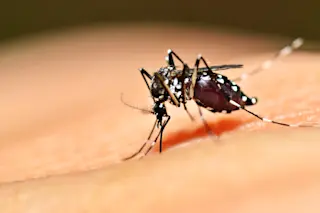Image courtesy of mrfiza/shutterstockDEET is the mother of all mosquito repellants. Its strong stench keeps bugs at bay by affronting their olfactory systems with an intensely offensive odor. But scientists are now running into a problem with DEET's effectiveness: after three hours the stuff no longer deters buzzing biters. N,N-Diethyl-3-methylbenzamide, a.k.a. DEET, first emerged as a pesticide for crops, but the U.S. military then developed the chemical for use against biting insects in jungle environments during World War II. Available as a spray or a lotion, DEET is still used today to repel flies, ticks and mosquitoes, and to protect against the diseases these bugs can transmit. But now, researchers in London have shown that three hours after Aedes aegyptimosquitoes were exposed to DEET, they seemed to become immune to the smell and were no longer repulsed by it. This species, also known as the yellow fever mosquito, is notorious ...
Disease-Carrying Mosquitoes Can Tolerate DEET Repellant
Discover the challenges of using mosquito repellants like DEET, as Aedes aegypti mosquitoes may adapt and resist its effectiveness.
More on Discover
Stay Curious
SubscribeTo The Magazine
Save up to 40% off the cover price when you subscribe to Discover magazine.
Subscribe













